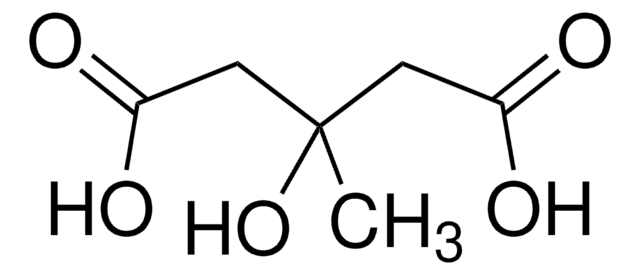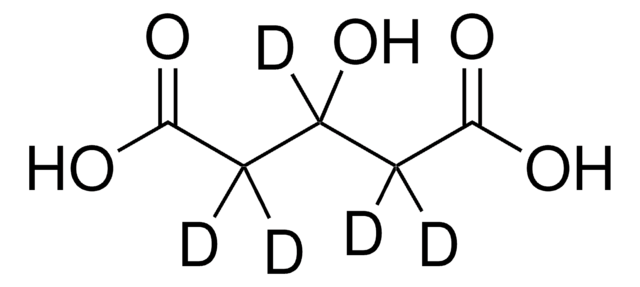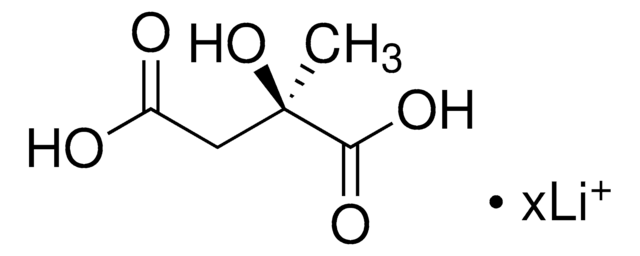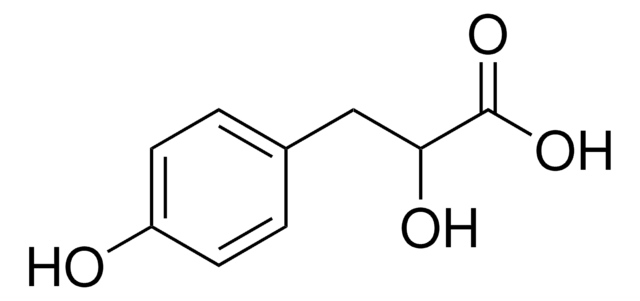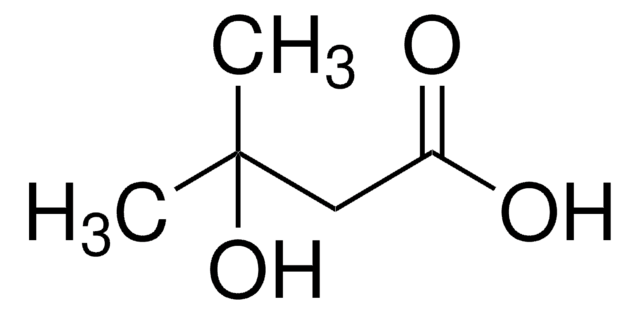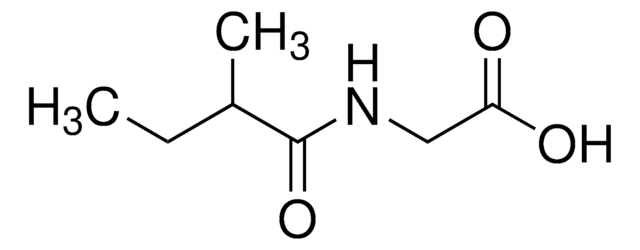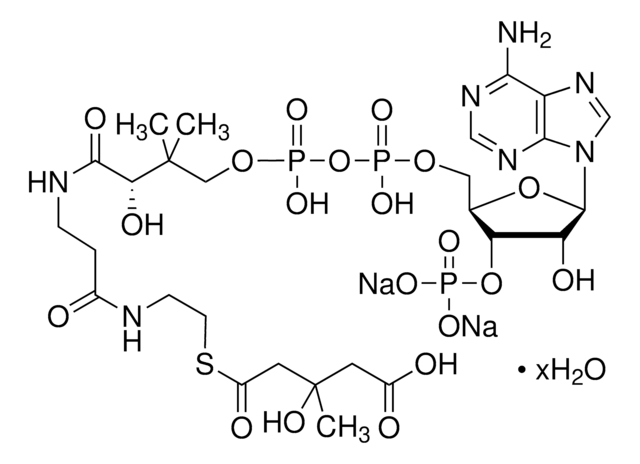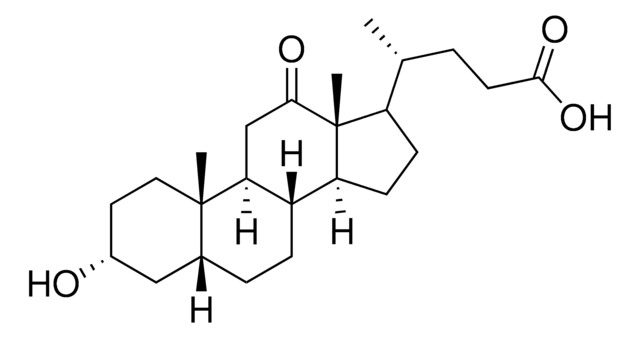44108
(E)-3-Methylglutaconic acid
≥97.0% (HPLC)
Sinonimo/i:
(2E)-3-Methyl-2-pentenedioic acid
Autenticatiper visualizzare i prezzi riservati alla tua organizzazione & contrattuali
About This Item
Formula empirica (notazione di Hill):
C6H8O4
Numero CAS:
Peso molecolare:
144.13
Beilstein:
1722909
Numero MDL:
Codice UNSPSC:
41116107
ID PubChem:
NACRES:
NA.24
Prodotti consigliati
Livello qualitativo
Saggio
≥97.0% (HPLC)
Punto di fusione
137-143 °C
applicazioni
clinical testing
Formato
neat
Temperatura di conservazione
2-8°C
InChI
1S/C6H8O4/c1-4(2-5(7)8)3-6(9)10/h2H,3H2,1H3,(H,7,8)(H,9,10)/b4-2+
WKRBKYFIJPGYQC-DUXPYHPUSA-N
Azioni biochim/fisiol
3-Methylglutaconic aciduria (MGCA) is a group of metabolic disorders characterized by increased urinary excretion of 3-methylglutaconic acid and 3-methylglutaric acid. Five distinct forms of MGCA have been recognized. MGCA type 1 is caused by primary deficiency of the mitochondrial enzyme 3-methylglutaconyl-CoA hydratase (3-MGCH), resulting in a block of leucine degradation. In all other types, the activities of 3-MGCH and other enzymes of leucine degradation are normal and the MGCA is thought to be secondary to a defect in another pathway. MGCA type 2, also known as Barth syndrome, is an X-linked cardiomyopathy associated with skeletal myopathy, neutropenia, and growth retardation. MGCA type 3, also referred to as Costeff optic atrophy syndrome, is an autosomal recessive disorder caused by mutations in the gene OPA3. It is characterized by early-onset bilateral optic atrophy, later-onset extrapyramidal dysfunction. MGCA type 5 caused by mutation in the DNAJC19 gene, is characterized by early-onset dilated cardiomyopathy with conduction defects, nonprogressive cerebellar ataxia, testicular dysgenesis, and growth failure. MGCA type 4 is the unclassified type, which includes all other patients with MGCA.
Avvertenze
Warning
Indicazioni di pericolo
Consigli di prudenza
Classi di pericolo
Eye Irrit. 2 - Skin Irrit. 2
Codice della classe di stoccaggio
11 - Combustible Solids
Classe di pericolosità dell'acqua (WGK)
WGK 3
Punto d’infiammabilità (°F)
Not applicable
Punto d’infiammabilità (°C)
Not applicable
Scegli una delle versioni più recenti:
Certificati d'analisi (COA)
Lot/Batch Number
Non trovi la versione di tuo interesse?
Se hai bisogno di una versione specifica, puoi cercare il certificato tramite il numero di lotto.
Possiedi già questo prodotto?
I documenti relativi ai prodotti acquistati recentemente sono disponibili nell’Archivio dei documenti.
Solution of a classical problem. Tautomerism and isomerism in the α-methylglutaconic acid series
Kagan, J., et al.
The Journal of Organic Chemistry, 40, 3085-3093 (1975)
Metabolic profiling of urinary organic acids by single and multicolumn capillary gas chromatography.
M F Lefevere et al.
Journal of chromatographic science, 27(1), 23-29 (1989-01-01)
High-resolution gas chromatography (HRGC) and gas chromatography/mass spectrometry (GC/MS) are the techniques of choice to determine the retention indices of more than 200 organic acids as their trimethylsilyl (TMS) or oxime-trimethylsilyl derivatives. Several types of apolar and semipolar fused-silica capillary
M Fontaine et al.
Clinica chimica acta; international journal of clinical chemistry, 255(1), 67-83 (1996-11-15)
We report clinical and biological investigations in two patients (twin brothers) with 2-methylacetoacetyl-CoA thiolase deficiency. Main clinical features included important staturo-ponderal delay, frequent infectious rhinopharyngitis episodes and an acute metabolic acidosis at the age of 4 years, this metabolic decompensation
M Duran et al.
Biomedical mass spectrometry, 9(1), 1-5 (1982-01-01)
The identification of (E)-2-methylglutaconic acid, a 'new' metabolite of isoleucine, is described. The substance was detected in urine samples from patients with propionic acidaemia, methylmalonic acidaemia and so-called beta-ketothiolase deficiency; in the majority of cases together with N-tiglylglycine. (E)-2-Methylglutaconic acid
Il team dei nostri ricercatori vanta grande esperienza in tutte le aree della ricerca quali Life Science, scienza dei materiali, sintesi chimica, cromatografia, discipline analitiche, ecc..
Contatta l'Assistenza Tecnica.